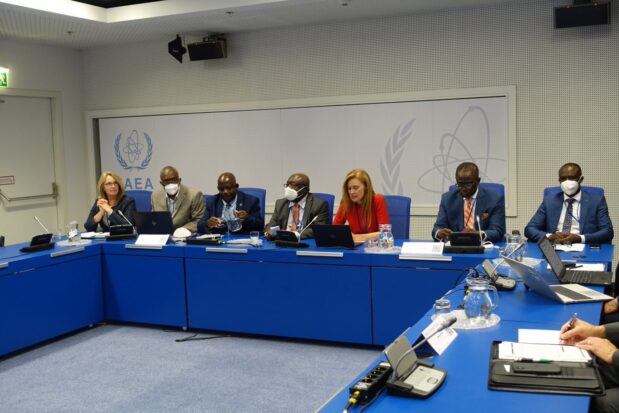On 22 September 2021, during the 65th IAEA General Conference, the VCDNP and the Permanent Mission of Ghana to the UN in Vienna organised a hybrid (in-person and virtual) side event on Ghana’s successful implementation of phase 1 of the IAEA Milestones Approach. The side event was held with the support of the US Department of Energy. Ghanaian Ministers and Directors-General of key organisations provided insights into the importance of government and stakeholder support, the coordination role of the Ghana Nuclear Power Programme Organisation (GNPPO), establishing a 3S (safety, security and safeguards) nuclear regulatory authority, and the early designation and activities of an owner/operator for the future nuclear power plant.
Ghana has been interested in nuclear power for a long time, and in 2008, the Government established a presidential committee to report on the feasibility of adding nuclear to Ghana’ s energy mix. Based on the committee’s report, and in line with the IAEA Milestones Approach, the GNPPO was formed in 2012 to oversee a systematic and methodical investigation of the national infrastructure required to implement a nuclear power programme. Ghana does not have the resources of a high-income country but nevertheless has been able to progress through the “studying and planning” Phase 1 of the Milestone Approach, requesting and hosting an IAEA Phase 1 Integrated Nuclear Infrastructure Review (INIR) mission in 2017 and an INIR Phase 1 Follow-Up mission in 2019, and transitioning successfully into Phase 2.
Speakers during the side event were:
- Ms Elena Sokova, VCDNP Executive Director (Opening Remarks)
- Dr Kwaku Afriyie, Minister for Environment, Science, Technology and Innovation
- William Owuraku Aidoo, Deputy Minister of Energy
- Prof Ben Nyarko, Director General of the Ghana Atomic Energy Commission
- Dr Nii Allotey, Director General of the Ghana Nuclear Regulatory Authority
- Dr Stephen Yamoah, Executive Director of Nuclear Power Ghana
- Ms Ingrid Kirsten, VCDNP Senior Research Associate (Moderator)
The speakers emphasised that the Ghana nuclear power programme has wide political support aimed at energy security for Ghana but also for the West African region, while ensuring that climate change goals can be met. They also confirmed that large nuclear power plant technologies that are currently commercially available will meet Ghana’s needs and are consistent with the electrical grid studies that have been performed. Ghana will continue to monitor the progress with the deployment of SMRs but will not consider “first of a kind” technology for its nuclear power programme. Ghana intends to use the energy produced by the nuclear power plant to help meet the current electricity needs of the country and to stimulate economic development including for the development of the mining sector.
Valuable lessons learned were shared by the speakers and advice provided to countries who are considering embarking on nuclear power, which include:
- Establish a Nuclear Energy Programme Implementing Organisation (NEPIO) early in the programme with well-defined objectives and mandate.
- Assemble a young, talented, dedicated and competent team as the technical support to the NEPIO in order to address the 19 infrastructure issues.
- Establish national project(s) with the IAEA and identify the right people with the right attitude to work with the IAEA to achieve the objectives of the project(s).

